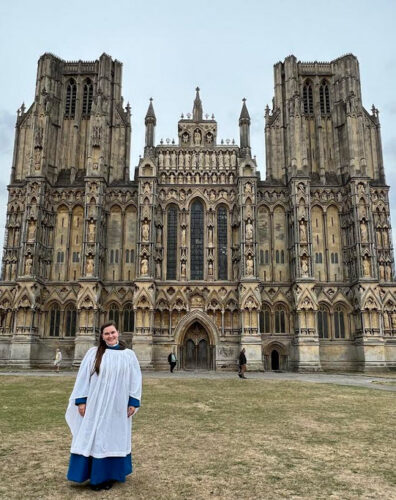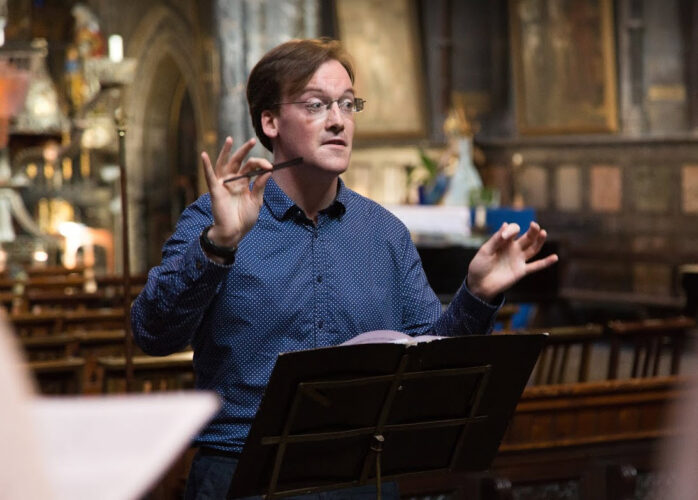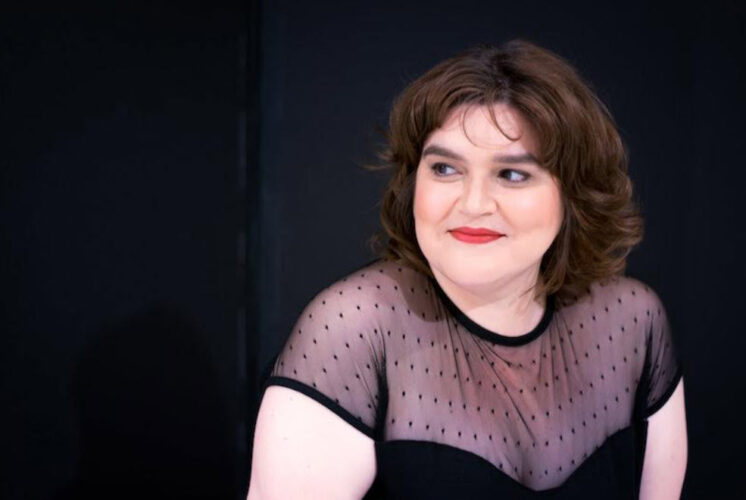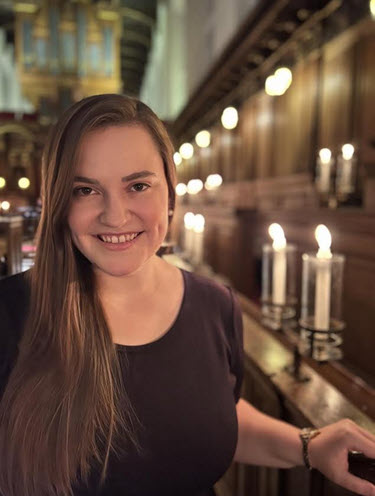North American singers chase their ambition to join Britain’s professional early-music choral scene
They navigate obstacles in musical styles and sight-singing, in salaries and immigration. They balance career satisfaction with a longing for home.
This article was first published in the September 2024 issue of EMAg, the Magazine of Early Music America

When Natalie Manning was appointed Alto Vicar Choral in 2022 at Wells Cathedral, the splendid Gothic landmark about 40 minutes southwest of Bath, she shattered a stained-glass ceiling almost a thousand years old. The Texas native became the first female member of the Vicar Choral since it was founded in the year 1100.
She also joined a select company of singers from the U.S. and Canada who are building successful careers in Britain’s professional early-music choral scene.
For anyone enamored with choral singing, Britain offers many attractions: a long tradition of cathedral and college choirs specializing in the sacred music of the Medieval and Tudor eras, spanning Catholic and Protestant soundworlds; fine, ancient chapels and churches in which to sing; a critical mass of vocal and instrumental ensembles excelling in pan-European Renaissance and Baroque repertoire; and robust academic scholarship in early music and its performance. I spoke with three of these singers, two from the U.S. and one from Canada, to learn more about what brought them to the U.K. and the obstacles — immigration and otherwise — they have overcome to establish themselves in England.
For many North Americans working in Britain, their career choices grew out of the same source: hearing the award-winning recordings of choirs such as King’s College and Trinity College, Cambridge, the King’s Singers, the Taverner Choir, and, more recently, groups like The Sixteen, Voces8, and I Fagiolini.
“I grew up listening to the Monteverdi Choir, the Tallis Scholars, Emma Kirkby,” says mezzo-soprano Luthien Brackett, who today performs regularly both as a chorister and a soloist with those same groups, among many others.
She cites the transformative, period-instrument recording of Messiah, with Christopher Hogwood conducting the Academy of Ancient Music and Oxford’s Choir of Christ Church Cathedral, from 1981, as having “a massive influence. I have always modeled my own singing on that style.”
The 100th Milestone
Canadian baritone, conductor, and musicologist Greg Skidmore has also sung with many of Britain’s top choirs, in addition to directing the London-based Lacock Scholars and the Brighton Consort, and juggling a busy guest-conducting schedule on both sides of the Atlantic. Like Brackett, Skidmore developed his passion for early music through recordings he discovered as a teenager, performed by groups such as Trinity College Cambridge and the King’s Singers, as well as Toronto’s Tafelmusik Baroque Orchestra.

“I especially loved the music of the late Medieval and Renaissance periods — Byrd, Tallis, Josquin,” he says. “It just spoke to me at a deep, instinctive level, and that gut feeling has always stayed with me.”
Skidmore grew up in the Canadian university town of London, Ontario, about a two-hour drive southwest of Toronto. “I always like to surprise people in the U.K. by telling them I’m a Londoner born and bred,” he says with a laugh.
‘It spoke to me at a deep, instinctive level, and that gut feeling has always stayed with me’
Demonstrating musical talent at an early age, Skidmore participated enthusiastically in various children’s and youth choirs, although a career singing early music — the genre that appealed to him — seemed out of reach.
“When I was a teenager, the only way I knew of to be a professional classical singer was to be an opera singer, and I didn’t want to do that. To specialize in music written before 1650, and especially the music of the 15th and 16th centuries, which I was most interested in, seemed unfathomable.” So Skidmore entered the University of Western Ontario (aka Western) as a musicology student. “I never considered myself a performer.”
In 2002, when Skidmore was 18, he learned of a summer institute for Renaissance choral music in Oakham, in the English Midlands, an experience he calls “transformative.”
To earn the $4,000 tuition, he recalls that he “worked at Yard World for a whole summer selling lawnmowers and trimmers to earn the money. As soon as I returned to Western after that course, I just knew I had to find a way to get back.”
And he did. Through Western, he was able to arrange for an exchange year at Royal Holloway University — in that other, somewhat more famous London — through an opportunity made possible by a mysterious, generous British patron (who wishes to remain anonymous).
After completing his undergraduate studies, Skidmore became a postgraduate choral scholar at Wells Cathedral and a lay clerk at Gloucester Cathedral and Christ Church Cathedral, Oxford, where he eventually completed a doctorate in musicology, all while building up an impressive freelance career singing and conducting with many of the British and European ensembles that first inspired him. Now established in the British capital, Skidmore recently celebrated his 100th appearance with the Tallis Scholars and regularly sings with I Fagiolini, Voces8, and Alamire.
In 2018, in homage to the Oakham Institute that had such a profound impact on him at 18, he founded the Canadian Renaissance Music Summer Schools, which runs two-week courses in his hometown in London, Ont., as well as in Vancouver. Plans are afoot to add a third week in summer 2025. “In Canada we have excellent early-music groups, but not many focus on repertoire written before 1650,” he notes. “I think people are starved for it.”
Canada boasts excellent early-music groups, ‘but not many focus on repertoire before 1650. I think people are starved for it.’
Like Skidmore, Natalie Manning went to university with a different career in mind. “I wanted to teach choir and be a music educator,” she says over the phone from her fairytale, 13th-century house in Wells’ Vicar’s Close on perhaps Europe’s oldest intact medieval street. (Free housing is one of the many cool perks of her job).
A product of a Dallas public school with an excellent music program, Manning started singing in school choirs and musical theater. She was studying music education at the University of North Texas, in Denton, when she was recommended for an alto soloist job at the Episcopalian Church of the Incarnation in Dallas.
“I had no inkling of the English choral tradition until then,” she says. “I didn’t know any of the repertoire, and I was really stressed that I wasn’t going to do a good job. But I was a good sightreader, and we sang Evensong every week, which is incredibly rare outside of places like New York or Boston. Also, the director, Scott Dettra, saw something in me that he thought was worth encouraging. So I worked my butt off and learned pretty quick.”
Manning finished her music education degree and became the assistant choir teacher at her former middle school — while spending hours driving in traffic to freelance gigs around the sprawl that is Dallas.
“I loved it, but I was exhausted. I knew it was getting to be too much. I always knew I wanted to leave. A lot of my peers had moved. Meanwhile, there I was, having gone to college basically next door to my parents’ house and working in my old school. I was worried about getting stuck.” In 2019 she applied to the University of Cambridge as a choral conducting master’s student, in large part “because I wanted to sing at Trinity (College).”
Playing Catch-up
Luthien Brackett came to sing in the U.K. at a later stage in her career. Like Manning and Skidmore, she was drawn to the English musical tradition, enrolling in 2018 in a master’s program in performance at the University of York. But she also immigrated for other, deeply personal reasons.

“In August 2017, I was diagnosed with early-stage breast cancer,” she says. “As a musical freelancer, the only reason I had some health insurance was through the Affordable Care Act. I was terrified the Republicans were going to repeal Obamacare. So it was a very big deal for my peace of mind and my recovery to move somewhere with universal healthcare. I was also worried about the direction the U.S. was going under Trump. I knew the U.K. wasn’t some utopia, and that the NHS (the U.K.’s public health service) was underfunded and had its problems. A lot of people I knew were completely distraught after Brexit” — the 2016 referendum to leave the European Union. “But I knew I had a better chance of surviving cancer with Britain’s healthcare system. On top of that, England was the center of the kind of singing I wanted to do.”
‘British singers are trained from childhood to sightread almost anything. I thought I was a pretty decent sightreader — until I moved here!’
For North American choral singers considering a move to the U.K., whether to study or work, Brackett, Skidmore, and Manning have similar advice. Number one: No matter how experienced you think you are, don’t expect things to be run like they are at home.
“British choirs really do not rehearse very much,” says Brackett. “One reason is that British singers are trained from childhood to sightread almost anything. I thought I was a pretty decent sightreader — until I moved here! The other reason is that this music-making has been done exactly the same way for a very, very long time. If you have grown up here, you come from a tradition of rote learning. You just know how things are supposed to sound, so you just get on with it. But if you don’t come from that tradition, you have to play catch-up.”
Skidmore agrees. “The importance of sightreading cannot be overstated. I’m not saying it’s impossible to get a job singing here if you aren’t an excellent sightreader, but it is foundationally important.”
While tradition can be comforting, it can also be suffocating and insular. Many British ensembles are just beginning to come to grips with the history of imperialism and colonialism entwined with their institutions and the music they perform. With a few exceptions, notably the Swan Consort led by Bengali-British conductor and organist Anita Datta, the vast majority of professional British early-music vocal ensembles are overwhelmingly white and middle-class.
Although none is from a racialized community, all three of the singers featured in this article bring different perspectives, experiences, and sensitivities to their craft, compared to singers who have lived and worked in England their entire lives. This diversity can only be positive for music-making. At the same time, Brits have a loathing for self-aggrandizement and will quickly skewer anyone who comes across as boastful or full of themselves.
“You’re the outsider here. You need to get over yourself,” says Manning. “You need to develop a thick skin and make your peace with the fact that it doesn’t matter what you did or who you sang with back home: Nobody cares.”
Brackett says that extremely detail-oriented conductors are the exception, not the rule. Unlike in North America, where some music directors can devote a quarter of an hour to obsessively polishing a single vowel sound, British professional choirs rarely spend much time on diction, in any language. There’s a long-running joke about snooty Brits not caring how they pronounce non-English words, but Skidmore points out a more practical reason: “When you’re singing in these cavernous Gothic cathedrals, it just doesn’t matter. Nobody is going to hear that level of detail, unless it’s a recording.”
Skidmore notes that basses and tenors in England also tend to sing much more loudly than they do back home, partly because they need to fill enormous buildings but also because it’s a numbers game. “In church men and boys’ choirs, you usually only have a handful of men who have to compete with absolute masses of trebles and their high, piercing timbre. Your job is to provide a kind of foundation. You learn pretty quickly to sing out.”
‘Straight tone’ and British Singing
The British love of a pure treble sound — the natural delivery of pre-pubescent boys — often extends to grown women, something that Brackett finds particularly irksome. The topic of straight-tone singing is a minefield of fraught debate, one that can make the directors who insist on it — usually men — seem callous, clueless, or misogynistic.
“Basses and tenors get to produce a normal, healthy sound but, for women, a lot of conductors want an anaesthetized, cloud-like sound with no vibrato at all. Unless your voice is naturally like a 10-year-old boy’s, it can lead to some pretty unhealthy singing.”

This might be different for future generations, as some of the last all-male institutions are finally opening their ranks to girl trebles and the different, but equally beautiful, sounds they produce. On June 30, two girls from St. Paul’s Cathedral School, in London, formally joined the St. Paul’s Cathedral Choir as full choristers for the first time in the ensemble’s 900-year history. Earlier this year, Chichester Cathedral allowed girls to audition for its famous choir for the first time.
When it comes to pay, Brackett and Manning agree that U.S. singers in particular will need to adjust their expectations. “The pay scale is much better in the U.S.,” Brackett says. “And unlike back home, where you can make a lot more as a soloist, the fees given to choristers and soloists [in Britain] are not substantially different.”
Skidmore, Brackett, and Manning all came to the U.K. on student visas, which they then switched to work-based visas as soon as they could. For freelance musicians, the Global Talent Visa usually represents the most viable route, although it requires some planning and proof of both past achievement — having your name on Grammy and Gramophone-winning recordings helps — and future employability. After five years in the U.K. on a non-student visa, one can obtain Indefinite Leave to Remain (ILR), meaning a visa is no longer required to work.
Brackett, Skidmore, and Manning all consider themselves comfortably settled in their new lives, with British romantic partners, homes, and busy, fulfilling careers. Still, some things from home will never have a substitute.
“Oh man, I miss sweet, brewed iced tea,” says Brackett, who grew up in Northern Virginia. “And good bagels. I have not found good pizza. I’m always complaining to my partner that I miss really good customer service. Air-conditioning and insect screens!”
“I miss Tex-Mex!” says Manning. “That is the best food in the world, and you just cannot get decent, authentic Tex-Mex here. Anytime I go home, that’s the first thing I want!”
Natasha Gauthier is a Canadian journalist, music critic, and poet currently living in Cardiff, Wales. She recently obtained an MA in Political Communication from Cardiff University and has been selected for the 2024-2025 Representing Wales cohort, the flagship career development program run by Literature Wales.

